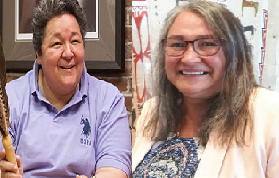
Marilee A Nowgesic & Lea Bill
Canadian Indigenous Nurses Association, Canada
Title: Cultural safety: Is it ok to be Indigenous?
Biography
Biography: Marilee A Nowgesic & Lea Bill
Abstract
This presentation will look at some of the issues the Canadian indigenous nurses association (CINA) and the Canadian association of school of nursing (CASN) addressing cultural competence and cultural safety. CINA is aiming to introduce Indigenous nursing curriculum as mandatory part of the Canadian nursing program curricula. This curriculum modification would be presented to all nursing students (Indigenous and non-Indigenous). These changes will include the integration of a mandatory course during the first year of nursing programs, which will allow students to mobilize their knowledge into their nursing practicum. To be inclusive of all indigenous participants, an interactive collaborative and interdisciplinary activity of all health care providers working in health care and health services delivery. The workshop will be divided into four parts: introduction, the method, the deliverables and the discussion. The first part, time will be provided for an historical interactive understanding of indigenous populations. The second part will be the effects of newcomers on indigenous health and populations. The third part will be on the effects of chronic disease, interventions and preventions. Finally, the last part will be on the demographics of the preceding three areas. Groups will be able to provide input and a wish list of how indigenous health may have looked with our current knowledge and tools and how the laws that were governing are exist and how they impact the health of our indigenous peoples. Participants will have asked, with the assistance of post-it notes, to place where they see their priorities based on the indigenous specific social determinants of health. On a subsequent exercise, they will have the opportunity to identify the barriers preventing the social determinants of health to be addressed as priorities. Participants will be able to bring home a USB key, containing information of historical and contemporary priorities and other indigenous health platforms from CINA. Participants will be able to have knowledge exchange and partnership engagement. They will also be able to participate as external stakeholders of CINA. Participants will also get a greater sense of the importance of sovereign Nations and impacts on current legislation. Participants will also be given opportunities discuss current trends or issues relatives the indigenous peoples (e.g. United Nations response to address gender-based violence, the role of the Senate of Canada in addressing indigenous issues). This area will have generated various levels of conversation based on academics, demographics, social impacts, alternative approaches and areas for research development. The discussion will be based upon the Government of Canada ability to address the Truth and Reconciliation Commission’s Calls to Action and to provide a status report those Calls to Action and the meaningful participation on indigenous peoples. The discussion will also be based upon the articles within UNDRIP and will also respond to the United Nations permanent forum on indigenous issues. As most recently, the discussion will also involve the recent report by the United Nation’s Human Rights office of the High Commissioner. That will look at new measures to target gender-based violence, especially against indigenous women.
